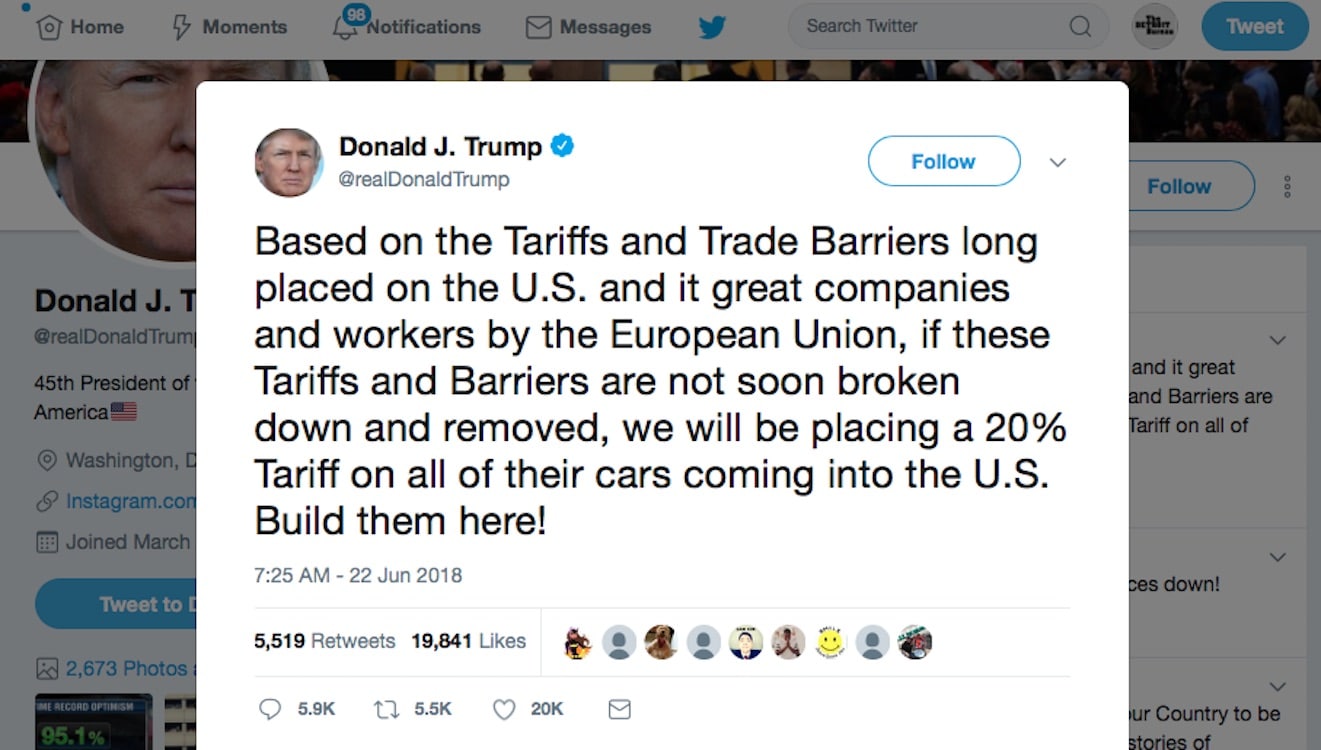Trump's Decision: EU Tariff Deadline Moved To July 9th

Table of Contents
The Original Tariff Threat & Its Impact
The initial threat of US tariffs on EU steel and aluminum, announced in 2018, sparked a major trade dispute between the US and the EU. These tariffs, ostensibly justified on national security grounds, threatened to impose significant duties on a wide range of steel and aluminum products imported from the EU. Had these tariffs been fully implemented on the original deadline (which was previously extended several times), the economic consequences for both the US and the EU would have been substantial.
-
Economic Fallout: The potential impact included job losses in affected industries, increased prices for consumers, and disruption to established supply chains. The World Trade Organization (WTO) even predicted retaliatory measures could trigger a global trade war.
-
Industries Affected: Industries like automotive manufacturing, aerospace, and construction, heavily reliant on steel and aluminum imports, would have been severely impacted. European businesses exporting these products to the US faced the prospect of significant losses and reduced competitiveness.
-
Retaliatory Tariffs: The EU responded to the initial threat with its own planned retaliatory tariffs on US goods, escalating the trade war and creating a climate of uncertainty for businesses on both sides of the Atlantic. This tit-for-tat exchange highlighted the interconnectedness of global trade and the high stakes involved.
Reasons Behind the July 9th Deadline Extension
The extension of the tariff deadline to July 9th suggests ongoing negotiations between the US and the EU. While the exact reasons remain somewhat opaque, several factors likely contributed to the delay.
-
Ongoing Trade Negotiations: The Trump administration may have sought additional time to finalize negotiations with the EU on a broader trade agreement. These negotiations could address issues beyond steel and aluminum, potentially encompassing agricultural products, digital trade, and other areas of economic friction.
-
Temporary Delay or Sign of Progress?: The extension could be interpreted as either a temporary pause to allow for further discussions or a sign of meaningful progress toward a more comprehensive trade agreement. The lack of clear public statements makes definitive conclusions difficult.
-
Domestic Political Factors: Domestic political considerations within the US, including upcoming elections and public pressure, might also have played a role in the timing of the deadline extension.
-
EU Response: The EU's response to the extension was cautious, with officials urging the US to permanently remove the tariffs and avoid further escalation. This underscores the EU's desire for a stable and predictable trade relationship with the United States.
Implications for Businesses
The July 9th deadline extension, while offering temporary relief, leaves businesses facing considerable uncertainty.
-
Short-Term and Long-Term Planning: Businesses must continue to carefully plan for both scenarios: the potential implementation of tariffs and the possibility of a negotiated resolution. This requires flexibility and adaptability in their business models.
-
Supply Chain Impacts: The uncertainty surrounding tariffs forces companies to re-evaluate their supply chains. Businesses might need to explore alternative sourcing options, diversify their supplier base, and build more resilient supply chain networks.
-
Investment Decisions: The persistent threat of tariffs discourages long-term investment decisions. Businesses are hesitant to commit to major capital expenditures or expansion projects until the trade dispute is resolved.
-
Mitigation Strategies: Businesses need to proactively implement risk mitigation strategies, such as hedging against potential price increases, exploring alternative markets, and diversifying their product offerings.
Navigating the Uncertainty: Strategies for Businesses
The ongoing trade dispute highlights the importance of business resilience and adaptability in the face of global economic uncertainty.
-
Diversify Supply Chains: Reducing reliance on single sourcing and exploring alternative suppliers globally can minimize disruptions.
-
Risk Management: Businesses should implement thorough risk assessments to identify and manage potential vulnerabilities. This might involve scenario planning, hedging strategies, and contingency planning.
-
Engage with Trade Associations: Participation in industry groups and trade associations provides access to valuable information, networking opportunities, and lobbying efforts.
-
Monitor Developments Closely: Continuous monitoring of the news and official announcements helps businesses react promptly to changing circumstances.
Conclusion
The postponement of the EU tariff deadline to July 9th offers temporary relief but doesn't resolve the underlying trade tensions between the US and the EU. Businesses must carefully consider the continued uncertainty and adjust their strategies accordingly. The next few weeks are critical in determining the ultimate outcome of these trade negotiations. Stay informed on the latest developments regarding Trump's decision and the EU tariff deadline. Monitor news sources for updates as the July 9th deadline approaches, and proactively adjust your business strategies to navigate the complexities of US-EU trade relations. Understanding the implications of the Trump administration's decisions on EU tariffs is crucial for success in the global marketplace.

Featured Posts
-
 Keown Claims Arsenal Have Secretly Signed A New Striker
May 28, 2025
Keown Claims Arsenal Have Secretly Signed A New Striker
May 28, 2025 -
 Liverpool Transfer News Is A League Best Dribbler The Replacement For Departing Star
May 28, 2025
Liverpool Transfer News Is A League Best Dribbler The Replacement For Departing Star
May 28, 2025 -
 Samsung Galaxy S25 Ultra 256 Go Performances Et Durabilite
May 28, 2025
Samsung Galaxy S25 Ultra 256 Go Performances Et Durabilite
May 28, 2025 -
 A Hideg Es A Talajnedvesseg Hatasa A Hazai Noevenykulturakra
May 28, 2025
A Hideg Es A Talajnedvesseg Hatasa A Hazai Noevenykulturakra
May 28, 2025 -
 Winning Euro Millions Ticket Found Appeal Launched In Ireland
May 28, 2025
Winning Euro Millions Ticket Found Appeal Launched In Ireland
May 28, 2025
